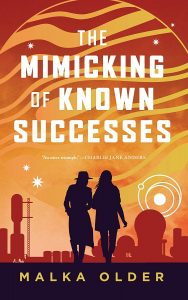Alexandra Pierce Reviews The Mimicking of Known Successes by Malka Older
 The Mimicking of Known Successes, Malka Older (Tordotcom 978-1-25086-050-7, $19.99, 176pp, hc) March 2023. Cover by Christine Foltzer.
The Mimicking of Known Successes, Malka Older (Tordotcom 978-1-25086-050-7, $19.99, 176pp, hc) March 2023. Cover by Christine Foltzer.
Imagine a future where the Earth has gone so completely belly-up that people have moved to Jupiter. But humans being humans, they’re not prepared to accept that as the end of the old world. So they set up a university and encourage research in Classics, which focusses on understanding Earth, its ecosystems and geography and so on; it’s the most prestigious area of research because that’s how Earth might be reclaimed. Next in the hierarchy are the Speculatives, considering what might be; and at the bottom of the pile are the Moderns: people who research the place where humans are actually currently living.
This is the backdrop for Malka Older’s new novella, The Mimicking of Known Successes – a very different location from the work she’s recently done for Realm’s Orphan Black and Ninth Step Station seasons. A similarity exists with the latter, though, in that the narrative is centred around a mystery: a man has gone missing, and Investigator Mossa must figure out how, and why, and who else was involved. Doing so leads her to the university where she once studied, and where her ex-girlfriend is now an academic – a connection that may prove useful, if also fraught.
Reading this novella was an absolute delight; it was one of those experiences where glancing at the number of pages left just made me sad. Older slowly reveals how humanity has managed to colonize the gas giant, and slowly teases out how their society works; it’s clear a great deal of thought has gone into the worldbuilding. I was particularly absorbed by the practical realities of spatial distribution of living spaces, in the upper atmosphere of a gas giant, and how transport could be made to work. It took me a little while to realize why the setting sometimes felt familiar: the wind and gasses blowing through the streets evoke a sense of Victorian London streets, with smog swirling around, for all that the two are millions of miles and centuries apart, giving this a gaslamp-fantasy feel within its science fiction setting. This similarity to London is entirely intentional because Inspector Mossa and Pleiti are Holmesian analogues in the best way: they complement each other, they work well together, and Mossa in particular shares characteristics with Sherlock – but in a not-annoying way.
As with the best murder mystery stories, it was entirely unclear (at least to me) what motives existed and who was involved in the crimes being investigated until it started becoming clear to Mossa and Pleiti; and when it finally is resolved, it comes together in a way that genuinely makes sense. The investigation is the catalyst for the story itself, and would have worked perfectly well if the people involved were simply colleagues – or indeed, if Mossa worked alone. However, the relationship between Mossa and Pleiti is a key element, deepening their existence as characters and making the whole investigation work and making the story that much deeper and richer. Theirs is a relationship that has known difficulty and heartbreak as well as joy. Older is honest about the difficulties, and about how time changes people and relationships – this is no starry-eyed vision of new love, but love that is experienced and slightly battered and very, very real. Their relationship helps elevate the novella from enjoyable to wonderful.
I can imagine further stories set in this world; if I’m very lucky, they will feature Mossa and Pleiti.
Alexandra Pierce reads, writes, podcasts, cooks and knits; she’s Australian and a feminist. She was a host of the Hugo Award winning podcast Galactic Suburbia for a decade; her new podcast is all about indie bookshops and is called Paper Defiance. Alex has edited two award-winning non-fiction anthologies, Letters to Tiptree and Luminscent Threads: Connections to Octavia E Butler. She reviews a wide range of books at www.randomalex.net.
This review and more like it in the November 2022 issue of Locus.
 While you are here, please take a moment to support Locus with a one-time or recurring donation. We rely on reader donations to keep the magazine and site going, and would like to keep the site paywall free, but WE NEED YOUR FINANCIAL SUPPORT to continue quality coverage of the science fiction and fantasy field.
While you are here, please take a moment to support Locus with a one-time or recurring donation. We rely on reader donations to keep the magazine and site going, and would like to keep the site paywall free, but WE NEED YOUR FINANCIAL SUPPORT to continue quality coverage of the science fiction and fantasy field.
©Locus Magazine. Copyrighted material may not be republished without permission of LSFF.







